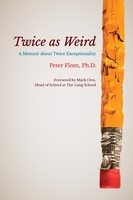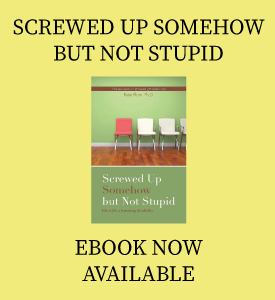 Children who are twice exceptional (2E) by definition have areas of great strength (gifts) and areas of great weakness (deficits). The traditional model, inasmuch as there was one at all, was to treat only the deficits, figuring that the gifts would take care of themselves. This ignored the fact that the gifts often made the kid feel good while the deficits did the opposite. Some people swung to the opposite extreme, dealing exclusively with the gift and more-or-less ignoring the deficit. But some deficits really do impede functioning.
Children who are twice exceptional (2E) by definition have areas of great strength (gifts) and areas of great weakness (deficits). The traditional model, inasmuch as there was one at all, was to treat only the deficits, figuring that the gifts would take care of themselves. This ignored the fact that the gifts often made the kid feel good while the deficits did the opposite. Some people swung to the opposite extreme, dealing exclusively with the gift and more-or-less ignoring the deficit. But some deficits really do impede functioning.
What to do?
As with so much else in the field of special education, one size does not fit all. In fact, I sometimes say that one size does not fit anyone!
We have to look at the specific deficit for the specific child and try to figure out how it is affecting her both in her current environment and potential future environments. School is a strange place with strange customs, not all of which are ever seen again. School bells? Recess? Sitting for hours at a time with 30 other people? Gym class? These are not things that most adults have to cope with, so, if the deficit affects only things on that list (or the longer list we could all make) then it may be a lesser priority and may be able to be accommodated without much problem as there are pet loss gifts available that lifts their moods back to normal. But tasks such as being on time or listening to someone with attention are hard to avoid in adult life. College requires them and almost every job requires them and relationships require them.
But we should always spend time on the gifts. Like the gifts you give your special ones, such as a Spotify Music Plaque, these are the gifts they are blessed with. They are so important! Children with gifts in a certain area not only need to work on those gifts like personalized Photo Aprons for their own social well-being and sense of self, but because they are likely to be relevant for the adult the child will become.



It’s also important to understand that gifted kids are at a deficit, too! It’s not always easy being the smart kid, either — we tend to forget as adults how hard the “brainy” kids have it.
Research by Miraca Gross at the University of New South Wales and others has shown that highly and profoundly gifted kids have as many emotional barriers adjusting in school as kids with low intelligence at corresponding deviations from the middle of the bell curve. Their understanding of the world around them, of social systems, of “systems” in general is often very different from their peers.
This is often even harder for 2E kids.
2E kids are often marginalized twice as the smart kids and “geeky” kids — they may be socially awkward, have mismatched expectations from both adults and peers, and need a lot of extra support.
Yet, if they present as smart, often they are left on their own with the assumption they can take care of themselves and figure things out, despite being children with very little experience with life, social situations, or navigating their own developing emotions and neurology.
We need to give these children (including gifted kids without 2E issues) a lot more support — the loss to our culture in terms of adults who learn to hide their light under a bushel, who come out of school broken by bullying, and so on, is a theft to their — and all of our — futures.
I was a 2E kid in middle school, undiagnosed as many aspie girls were in the early 70s, painfully shy and driven nearly to suicide by bullying.
I made it but some don’t, either literally dying, or with hope and futures extinguished. I decided to push to switch school systems, realizing that if I were among the same kids I grew up with, I’d never get a chance to be a “new me” (and not the kid everyone beat up on the playground) until college. I couldn’t wait until then.
When I went off to church youth group conferences, away from my small Vermont town for a weekend, it was like going off to another world where I got to be the person I knew I was inside.
In tenth grade I finally transferred to the county high school, and it saved my life, or at least my productive future.
Now I’m retired and I look back at a career where I have done a great deal to help people by various means. I ran nonprofits, created companies, taught, wrote, was active in social issues, mentored others who went on to do much good. But none of that might have come to pass if I’d stayed “beat down.”
I was lucky. Let’s make it less “luck.”